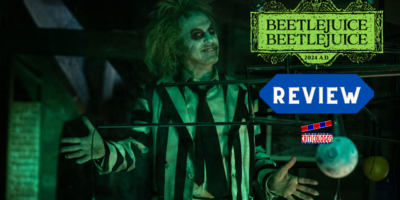
El Conde: Larraín takes a bite on the horror genre
Amongst his filmography, acclaimed Chilean director, Pablo Larraín, has managed to deep dive and capture the psyche of real-life figures with his biopics. In Jackie, he explores the grief and trauma of Jaqueline Kennedy following the assassination of her husband, John F. Kennedy. Moreover, in Spencer, Larraín provides an intimate portrayal of Princess Diana during her struggles within the British royal family. Showcasing their vulnerability and pressure of their public life through cinematic lens. While his last two films display historical influential women within a nonfiction story, Larraín takes a different approach in his latest film, El Conde.
El Conde reimagines a universe where Chilean general and dictator, Augusto Pinochet, is not merely a historical figure, but an aged vampire who has survived for 250 years. Switching from non-fiction narrative to fiction, Larraín uses the horror genre as a getaway for his satire and comedy concoction. Focusing on the vampirism subgenre as a metaphor for the lasting impact of his political influence and how capitalism can literally blood suck the life out of you. Pinochet isn’t the only focus within the film. The director’s intense sense of irony is also seen with the portrayal of the dictator’s family. Despite not being vampires at all, his children and wife display vampiric characteristics by craving wealth and power the same way that the nightly creature craves blood.
After living for many decades, 250 years to be exact, Pinochet wants to be laid to rest; passing his days yearning for death on his desolated and secluded island. The cinematographer, Edward Lachman (Cinematographer for The Virgin Suicide and Carol), captures the lifeless and somber life of the characters with his spellbinding black and white palette. From seeing the vampires fly around the island to having a marching band inside your house, each composition strikingly pleasing. In addition, the visuals blend perfectly well with the melancholic score, emphasizing the sense of dread.
Portraying Pinochet as an old decrypt vampire is without a doubt the big punchline within the story. Flying in the dead of the night with his big cape in search of his next victims or shaking his head as to why there isn’t a bust of him in the presidential palace; the movie makes it abundantly clear of its sarcasm and satire. But what started out as the main gag, begins to lose the spark along the way, and the joke’s appeal fades as it’s repeatedly drawn out. In its attempts to highlight allegories and metaphors in the form of a joke, it decreases the overall impact of the story; relying on the giggles rather than building a strong narrative.
El Conde’s whimsical nature and satirical essence is bound to spark a conversation. However, while the concept is rather fascinating, the story loses its intensity along the way. Relying more on the comedic bits rather than creating a narrative filled with substance. Nonetheless, the film is a visual symphony that will surely keep the viewers captivated.
Writer’s Note: This review was written and published during the strikes of the Writer’s Guild of America (WGA) and the Screen Actors Guild – American Federation of Television and Radio Artists (SAG-AFTRA). Without their work, the film being covered would not exist.




